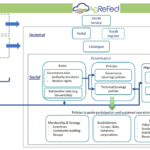“It really matters to me that my work contributes to the public good, that people can benefit from what I do. So working to support the sharing of data for re-use, for greater promotion and visibility, so that everyone can benefit from it, is important to me. A lot of my data is cultural data – I find this type of data so inspiring. Sharing a nation’s heritage and culture makes such a unique contribution to all the data available across the world. And how can we encourage research and creativity that builds on that data?”
Monthly Archives: July 2022
Jun 2022: Publications in the Data Science Journal

 Title: Development and Governance of FAIR Thresholds for a Data Federation Title: Development and Governance of FAIR Thresholds for a Data FederationAuthor: Megan Wong , Kerry Levett, Ashlin Lee, Paul Box, Bruce Simons, Rakesh David, Andrew MacLeod, Nicolas Taylor, Derek Schneider, Helen Thompson URL: http://doi.org/10.5334/dsj-2022-013 |
Disaster Risk Reduction and Open Data Newsletter: July 2022 Edition


Data for Disaster Risk Reduction Episode two: Coordination and data management for response to recovery
In 2021, Emergency Event Database, the global database on disasters, recorded 432 events related to natural hazards worldwide. The first episode of the podcast series on Data for Disaster Risk Reduction explores data-driven response and recovery, data coordination, management, and required resources and infrastructure. Insights into policies to be adopted to use technology for better disaster prediction.
The episode has Yan Wang, Data Stewardship Coordinator at Delft University of Technology, Netherlands and Bapon Fakhruddin, Technical Director, Tonkin and Taylor, New Zealand.
WRAPUP 2-Western Europeans pant in early summer heatwave compounding climate change fears
With temperatures reaching 40 in France and Spain, Mediterranean nations are more and more worried about how climate change may affect their economies and lives.
Improving early warnings in the Caribbean, Pacific and Southeast Asia
A successful six-year, 10 million Canadian dollar project, funded by Environment and Climate Change Canada (ECCC), has strengthened the quality and availability of impact-based forecasts and services to support communities in Southeast Asia, the Caribbean, and the Pacific.
What’s Causing the Devastating Floods in China, India, and Bangladesh?
In central and southern China, tens of thousands of people have been forced to evacuate their homes due to flooding from extreme rainfall. Mingfang Ting, a research professor at Columbia Climate School’s Lamont-Doherty Earth Observatory, studies precipitation extremes. She pointed to several large-scale climatic conditions that could be contributing to the intense rainfall in China and South Asia.
Tsunami resilience: UNESCO will train 100% of at-risk coastal communities by 2030
At the UN Ocean Conference in Lisbon, Audrey Azoulay, Director-General of UNESCO will announce a new global programme to ensure 100% of coastal communities will be “Tsunami Ready” by 2030. Other conference highlights include the designation of Maya Gabeira, the Brazilian surfer, as a UNESCO Goodwill Ambassador.
Temperature records tumble in an early, intense heatwave
An unusually early and intense heatwave spread up from North Africa through Europe ahead of the Summer Solstice, bringing temperatures more typical of those witnessed in July or August. In some parts of Spain and France, temperatures are more than 10°C higher than the average for this time of year, breaking many monthly records. This is combined with drought in many parts of Europe.

Saving lives with FAIR data: evidence-based public policies and the impact of data in disaster and climate change risk management
Informed decision-making and coordinated action for effective disaster and climate change risk reduction require timely and reliable data and information. Technological advances enable us to better understand nature and society. However, despite these advances, challenges remain for Findable, Accessible, Interoperable, and Reusable (FAIR) data for decision-making. The COVID-19 pandemic is a good example of how data FAIRness saved lives. It is necessary to identify what challenges the government, non-governmental organisations, and policy users face in FAIRness of data.
Minimising waste to reduce emissions: how do we turn waste into action
The NZ Emissions Reduction Plan released in early May 2022 sets out how the Government plans to deliver on the first three emissions budgets until 2035. It’s a step towards taking climate action – it’s now over to businesses, councils and industry to walk the walk and turn plans into a reality. Listen to the recording of this webinar where experts from T+T and Movac discuss, the opportunity for businesses to lead the charge using circular economy principles to reduce emissions, and resource efficiency = avoid wastage. Materials recovery and the potential investment opportunities for businesses and the shift from linear to the circular economy and the impacts and opportunities for your organisation.
Heatwaves: Addressing a sweltering risk in Asia-Pacific
The last decade was the warmest on record, and leading organisations on climate change indicate that warmer temperatures are not a potential threat but a surety. This report considers ways in which disaster risk reduction (DRR), climate change adaptation (CCA), and related scientific communities can rise to data challenges in order to provide policymakers with the evidence needed to set priorities and make decisions. Given the sizeable threat posed by extreme heat events, the report details the human impacts of heat waves, ranging from individual and community health to the built environment.
Disaster risk resilience: conceptual evolution, key issues and opportunities
This paper presents a selection of 25 components used to define resilience, and an interesting linkage emerges between these components and the dimensions of risk management (prevention, preparedness, response, and recovery), offering a perspective to strengthen resilience through the development of capacities. Despite its potential, resilience is subject to challenges regarding its operationalization, effectiveness, measurement, credibility, equity, and even its nature. Nevertheless, it offers applicability and opportunities for local communities as well as an interdisciplinary look at global challenges.
Real-time evaluation of Fao’s Response to the Desert Locust upsurge 2020-2021
FAO’s Office of Evaluation conducted a real-time evaluation across three phases spread over one year. Each phase covered specific aspects of the response: Phase I focused on leadership, management and coordination of the response and was conducted between June to October 2020. Phase II focused on results as well as management and operations at the country level. Phase III drew lessons for future operations and FAO’s work on Desert Locust in the Region.
Gender-responsive national adaptation plan Processes: progress and promising examples
This document is the third in a series of synthesis reports that assess progress on gender-responsive approaches in National Adaptation Plan (NAP) processes at the global level. It coincides with the midpoint of the Gender Action Plan under the United Nations Framework Convention on Climate Change (UNFCCC), making this a good moment to reflect on progress in integrating gender considerations in NAP processes.
Soil drought can mitigate deadly heat stress thanks to a reduction in air humidity
This article investigates the relationship between dry soils and heatwave lethality. Recent heatwaves often coincided with soil droughts that intensify air temperature but lower air humidity. Since lowering air humidity may reduce human heat stress, the net impact of soil desiccation on the morbidity and mortality of heatwaves remains unclear.

HLPF Side Event: A Risk-Informed Approach to Development in a COVID-19 Transformed World
The 2022 High-Level Political Forum (HLPF) on Sustainable Development will be held on 5-15 July 2022, under the theme of “Building back better from the coronavirus disease (COVID-19) while advancing the full implementation of the 2030 Agenda for Sustainable Development” which will feature thematic reviews of Sustainable Development Goals (SDGs) 4 on quality education, 5 on gender equality, 14 on life below water, 15 on life on land and 17 on partnerships for the Goals. A series of side events will convene on the margins of the HLPF, under the auspices of the ECOSOC.
VNR Lab: Applying the Sendai Framework to fast-track the 2030 Agenda through a risk-informed approach
The Voluntary National Reviews (VNRs) are inclusive reviews of progress at national levels, towards the Sustainable Development Goals, each year at the High-Level Political Forum (HLPF) for Sustainable Development. They aim to facilitate the sharing of experiences, including successes, challenges and lessons learned, with a view to accelerating the implementation of the 2030 Agenda.
International Data Week – A festival of data 23-26 October Salzburg
Save the date!
The International Science Council’s Committee on Data (CODATA) and World Data System (WDS), and the Research Data Alliance (RDA) are delighted to announce International Data Week 2023: A Festival of Data, taking place on 23–26 October 2023, in Salzburg, Austria.




